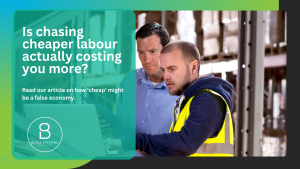Media and industry discourse on how to tackle semi-skilled labour shortages has focused less on the importance of hiring on attitude, and more on the Australian Government’s plans to introduce Temporary Skill Shortage (TSS) visas of late. With that, countless reports have emerged, detailing shortages across various sectors.
And rightfully so if we are to begin to understand where trends lie and where patterns have formed in terms of finding and retaining continuity of efficiency with labour hire.
Limited in this discussion is the very real need to dissect the nuances of hiring from a top-down point of view. Namely, that forward-thinking companies with lower and semi-skilled labour requirements have begun to think outside the box and recognise the benefits of hiring the right attitude and attributes over skills.
Shifting the emphasis away from what looks good on paper, to hiring those who genuinely want to work and contribute to a dedicated and engaged workplace is no new revelation though. According to Business Insider Australia, findings from a recent survey with 2,257 hiring managers revealed 29% “made a bad hire because they focused on skills and not attitude”.
Similarly, a 2017 article via USA today, reported that a hiring manager who embarked on seeking staff who were genuinely enthusiastic about maintaining employment or re-entering the workforce, reduced the entire recruitment and training turnaround time by approximately one month; this is in spite of these new recruits avidly engaging in additional upskilling to get up to speed.
Choosing the right fit, attitude-wise, has a longstanding impact on a workplace’s overall culture. As is with any environment, staff – temporary or permanent – who lead by example through reliability and a good work ethic, will inevitably shift the day-to-day dynamic and productivity levels for the better, posing the need for those who are reluctant to, to shape up or ship out.
The case for companies doing their part
It works both ways. If workplaces want to attract and retain good people, these values should be infiltrated internally, from hiring, through to induction and beyond – this should comprise integrated and seamless staffing processes and the fostering of the kind of organised and safe work environment that good quality labour would want to be a part of.
Similarly, companies with continual labour hire requirements benefiting from the attitude-over-skills approach also recognise the need to move quickly when they do come across a good candidate to avoid missing out. If your recruitment process isn’t vast and organised, you risk a candidate of interest being appointed elsewhere, resulting in costly time lost.
It goes without saying that partnering with a trusted, industry-specific recruitment provider helps to avoid this – particularly if seasonal demands and temporary requirements are an inevitable aspect to business-as-usual. In doing so, a multi-channel candidate sourcing strategy should be applied and infrastructural frameworks and systems around quality assurance, payroll and induction, should be implemented with as little disruption to company operations as possible.
Furthermore, a recruitment provider’s networks are typically broader and cast wider, enabling the capability to source people who fit the attitude-over-skills model with greater success.
With human resources, hiring processes and governance, being a recruitment provider’s primary focus, they ought to do this well. That is to leave companies to focus on what they do best – operate with sufficient and thriving headcount and a healthy bottom line.
Have you got questions about this article or about staffing needs? Phone us at Blaze Staffing Solutions on 1300 008 005 to speak with one of our recruitment specialists or email us at info@blazestaffing.com.au









